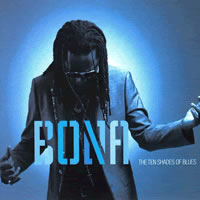Ten Shades of Blues
When Richard Bona's new album Ten Shades Of Blues appears this autumn, ten years will have gone by since his first project, Scenes From My Life (released in 1999), a whole decade. In the case of Cameroonian bassist and singer Richard Bona, it's not so easy to condense a decade into just a few short lines because the man is such a multiple character, with many lives impelled by his permanent curiosity and desire to play. And each of these traits lies at the heart of his latest recording to date, an album devoted to the blues and "its key notes that can be recognized in all cultures." So here we have a new album open to all kinds of encounters, a record on which Richard Bona is our guide taking us on a tour with his Indian, country and jazz musicians to the four corners of the earth…
"I like each of my albums to have a theme, a project behind it. This time I chose the blues. I look at the blues from the universal angle: you can find it in Africa, in America and in India. People put a style to it, a style with guitar and vocals. But I see it first as a scale, one that's present in different traditions and expressions in music. Ten Shades Of Blues means ten nuances, ten different ways of playing the blues." So Richard Bona put this new album together in the way that some people prepare a world-trip. "I went to Madras, and Bombay, and Nashville, and New York. Each time, I was playing with guys I'd played with before at some point." How does he define the blues? "A few notes where each one has the strength to reach out and touch you. They're present in all kinds of popular music everywhere in the world, they resound in people's hearts. There's also a particular way to play them and join them together."
Richard Bona gives you his take on the intention and feeling behind each song from his album, track by track:
Take One: I wanted to open the album on my own over a vocal theme. Singing is the basis of the blues: people expressing their pains and joys. This is sung a capella, but without lyrics; I just sing the notes I'm playing on the guitar. And Take One is a nod in the direction of the Take 6 vocal group.
Shiva Mantra: This is an invitation to meditation. I recorded the street-sounds in New Delhi. The blues is a religion in India. The title is an incantation meant for the goddess Shiva, who's worshipped by everyone over there. I recorded the tune in Bombay, added percussion in New Delhi, and we recorded the singer in Madras. I'd met all of these musicians on previous tours: Shankar Mahadevan and Nandini Srikar sing vocals; Vivek Rajgopalan plays the mridangam, a little finger-drum, and the ganjira, a kind of tambourine, and also sings konnakol (vocal percussion); Satyajit Talwalkar plays the tabla and also sings konnakol; and Niladiri Kumar plays the sitar.
Good Times: I feel close to urban blues and soul in America, close to artists like Donny Hathaway. Here I'm accompanied by Frank McComb, an excellent singer I've known for several years. I played bass on his first album.
M’Bemba Mama: I wanted to pay a tribute to all mothers, including mine. The title means "The tears of the mother". It's not necessarily sad. These are the joys and sufferings of a mother: they're there to protect us all their lives. Playing with me here are Sylvain Luc (guitar), Jean-Michel Pilc (piano) and Obed Calvaire (drums).
Kurumalete: This is the name of a sorceress. In Africa, when someone dies, they invoke a sorcerer. In fact, here I'm asking people not to hide systematically behind their beliefs, but accept destiny rather than looking for whoever's responsible or some spell. When I was little I heard this phrase, "If you don't stop crying I'm going to call Kurumalete."
Souleymane: The story of a boy with bad manners.
African Cowboy: This is me, a little bit. My life. Ryan Cavanaugh, a Texan, plays banjo, and Christian Howes is on violin. They come from country music. I love that music. The banjo's one of our instruments also. And there again, country music uses the notes of the blues.
Esukudu: The word means a school. I'm asking young people not to overlook the need to learn and better themselves. I've been lucky enough to meet musicians in France and America who've taken me forward. Exchanging with people from other cultures is most important.
Yara’s Blues: Yara is the name of my wife. I wrote the lyrics in Duala and a friend of mine translated them from Duala into English.
Sona Moyo: This song is for my brother-in-law. Where I come from, the brother-in-law has to provide a dowry. Today it's a camel or a sheep; before, it was cashew-nuts or tobacco... But this guy's from Brittany!
Camer Secrets: On this composition, the first beat moves systematically. Before, people in Cameroon used to dance to that. Today very few people know how to follow these composed rhythms. So that's where the title comes from, the secrets of Cameroon.







